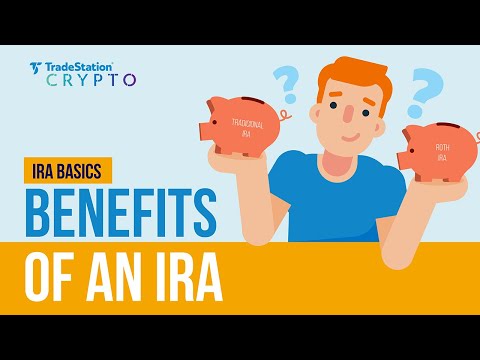Benefits of IRA
An Individual Retirement Account (IRA) is a popular investment tool that provides several benefits for individuals looking to save for retirement. In this article, we will explore the various advantages of having an IRA and how it can help you secure a comfortable financial future.
Tax Advantages
One of the key benefits of an IRA is the tax advantages it offers. Contributions made to a traditional IRA are often tax-deductible, meaning you can reduce your taxable income for the year. This can result in significant savings, especially if you are in a higher tax bracket.
Additionally, the growth of investments within an IRA is tax-deferred. This means that you do not have to pay taxes on any capital gains, dividends, or interest earned on your investments until you start making withdrawals during retirement. By deferring taxes, your investments have the potential to grow faster over time.
Retirement Savings
Another major benefit of an IRA is that it allows you to save specifically for retirement. Unlike regular savings accounts or other investment options, an IRA is designed to help individuals accumulate funds for their golden years.
By contributing to an IRA consistently over time, you can build a substantial nest egg that will provide financial security during your retirement. The power of compounding can work in your favor, as your contributions and investment returns generate more returns over the long term.
Investment Options
IRAs offer a wide range of investment options to suit different risk appetites and financial goals. Depending on your preferences and risk tolerance, you can choose to invest in stocks, bonds, mutual funds, exchange-traded funds (ETFs), or even real estate investment trusts (REITs).
Having a diverse portfolio within your IRA can help you mitigate risk and maximize returns. It is essential to consider your investment objectives and consult with a financial advisor to determine the most suitable investment options for your IRA.
Flexibility
IRAs provide flexibility in terms of contributions and withdrawals. With a traditional IRA, you can contribute up to a certain limit each year, and these contributions may be tax-deductible. However, it’s important to note that there may be income limits or restrictions based on your employment status.
When it comes to withdrawals, you can start taking distributions from your traditional IRA penalty-free once you reach the age of 59½. However, if you withdraw funds before this age, you may be subject to early withdrawal penalties. Roth IRAs offer even more flexibility, as you can withdraw contributions (not earnings) at any time without penalties or taxes.
Asset Protection
In some cases, IRAs offer protection from creditors. While the level of protection varies depending on state laws, IRAs generally provide a degree of shelter for your retirement savings. This can be particularly beneficial in times of financial hardship or if you face legal actions that could put your assets at risk.

An IRA offers numerous benefits to individuals planning for retirement. From tax advantages and retirement savings to investment options and flexibility, an IRA can play a crucial role in securing your financial future. Consider opening an IRA and start taking advantage of these benefits today.
Frequently Asked Questions about the Benefits of IRA
1. What is an IRA?
An Individual Retirement Account (IRA) is a type of investment account that provides tax advantages for individuals to save for retirement.
2. What are the main benefits of having an IRA?
The main benefits of having an IRA include tax advantages, potential the for higher returns, flexibility in investment options, and the ability to save for retirement.
3. How does an IRA offer tax advantages?
An IRA offers tax advantages by allowing individuals to contribute pre-tax money, which can lower their taxable income. Additionally, the earnings on the investments within the IRA grow tax-deferred until withdrawal.
4. Can anyone contribute to an IRA?
As long as you have earned income, you can contribute to a Traditional IRA. However, there are income limits for contributing to a Roth IRA.
5. What is the difference between a Traditional IRA and a Roth IRA?
A Traditional IRA allows for tax-deductible contributions, but withdrawals are taxed as ordinary income. A Roth IRA, on the other hand, uses after-tax contributions, but qualified withdrawals are tax-free.
6. Are there penalties for withdrawing money from an IRA before retirement age?
Yes, there are penalties for early withdrawals from an IRA. Generally, if you withdraw funds before the age of 59½, you may have to pay income tax on the amount withdrawn plus a 10% early withdrawal penalty.
7. Can I use the funds in my IRA to buy a house?
Yes, you can use funds from a Traditional IRA to buy a house without paying the early withdrawal penalty. However, there are specific rules and limitations for using IRA funds for a first-time home purchase.
8. Are there contribution limits for IRAs?
Yes, there are annual contribution limits for IRAs. As of 2021, the maximum contribution limit is $6,000 for individuals under 50 years old and $7,000 for individuals aged 50 and above.
9. Can I have multiple IRAs?
Yes, you can have multiple IRAs. However, the total contributions to all your IRAs cannot exceed the annual contribution limit.
10. Can I convert a Traditional IRA to a Roth IRA?
Yes, it is possible to convert a Traditional IRA to a Roth IRA. However, you will have to pay income tax on the amount converted in the year of the conversion.




